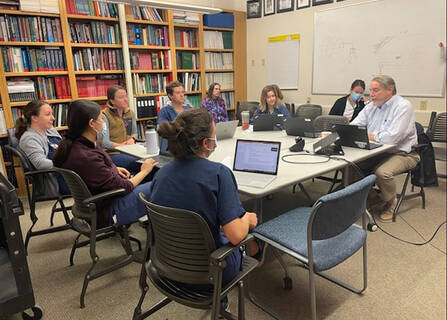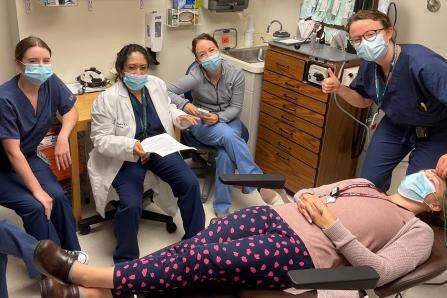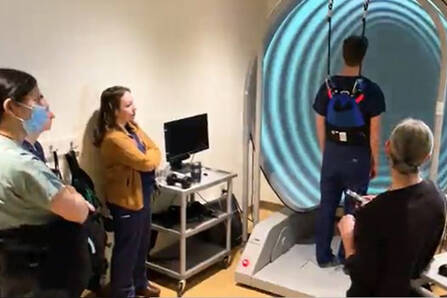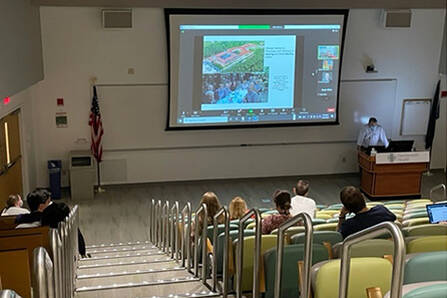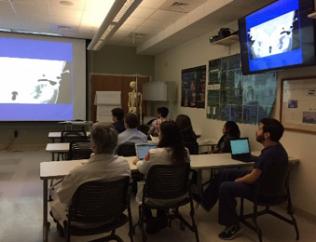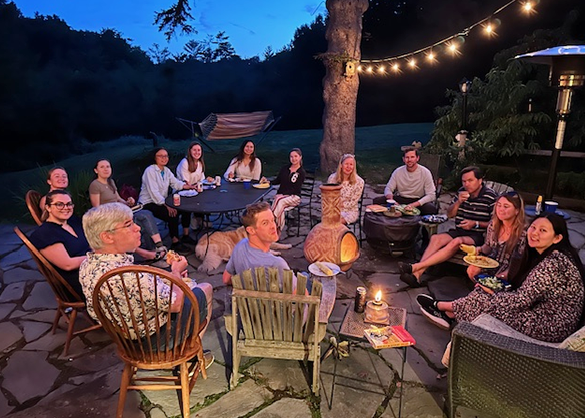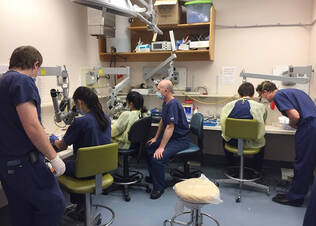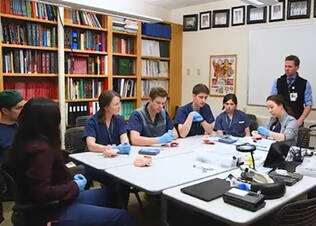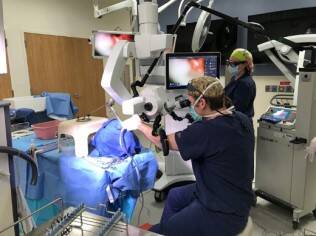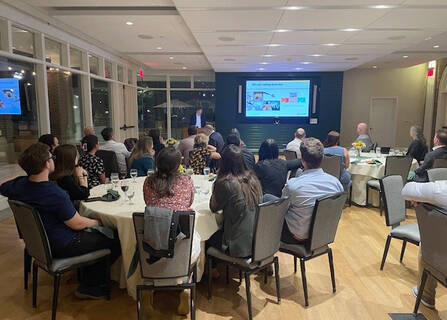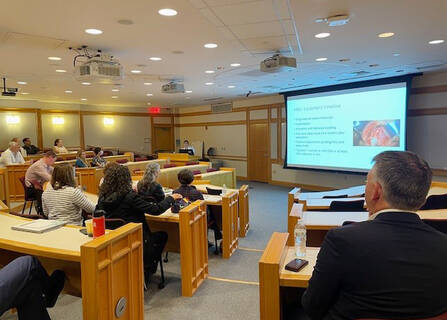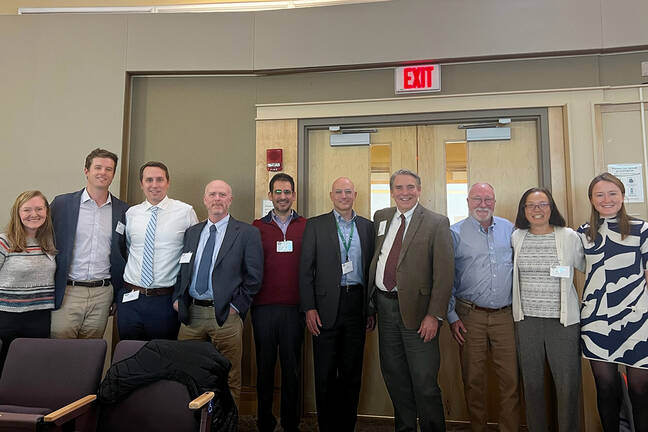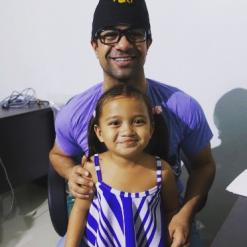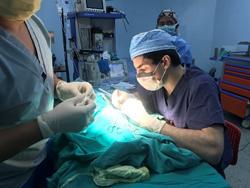| Monday | Tuesday | Wednesday | Thursday | Friday | |
|---|---|---|---|---|---|
| Wk 1 | 7-7:30 Planning meeting | 7-9 Head and neck/Laryngology | 7-8 Head and neck tumor board | 7-8 Surgery Grand Rounds | |
| 7:30-8:30 Facial Trauma/OMFS Series | 8-9 Head and neck pathology | ||||
| Wk 2 | 7-7:30 Planning meeting | 7-9 Pediatrics/General | 7-8 Head and neck tumor board | 7-8 OHNS Grand Rounds | |
| 7:30-8:30 Residency program meeting | 8-9 Journal Club article picking | ||||
| Wk 3 | 7-7:30 Planning meeting | 7-9 Otology-Neurotology | 7-8 Head and neck tumor board | 7:15-8 Head and Neck Radiology | |
| 7:30-8:30 Library/ research resources | 8-9 ENT/Plastics | ||||
| Wk 4 | 7-7:30 Planning meeting | 6-8 Journal Club | 7-8 Rhinology/Sinus | 7-8 Head and neck tumor board | 7-8 M&M/QI |
| 7:30-8:30 Resident Best Practices | 8-9 Audiology-Otology conference |
Planning meeting
Mondays: 7 to 7:30 am
The residents, attendings, and staff review the cases and events from the weekend on-call team and look at the week’s schedule to ensure resident coverage for all key indicator procedures and to optimize the number of learners in the operating room and clinic.
Facial Trauma/OMFS conference
Mondays (1st): 7:30 to 8:30 am
Facial Trauma/OMFS series led by Dr. Rocco Addante and Dr. Eric Holmgren includes lectures on mandible fractures, midface fractures, frontal sinus fractures, odontogenic lesions, and orthognathic surgery.
Residency program meeting
Mondays (2nd): 7:30 to 8:30 am
PD and residents meet monthly to review administrative tasks (case logs, work hour logs, VA credentialing), programmatic updates, and policy changes. This is also an opportunity for residents to voice any concerns and make recommendations regarding the program.
Research/library resource series
Mondays (3rd): 7:30 to 8:30 am
This conference, led by Dr. Saunders, will discuss the status of all active research projects. Research design, biostatistics, informed consent and IRB procedures, funding and common problems will be discussed.
The library resource series covers PubMed (MEDLINE), Evidence-Based Medicine, point-of-care resources, and reference management.
Resident best practices
Mondays (4th): 7:30 to 8:30 am
Senior residents lead sessions to guide junior residents and medical students on how to prepare for clinic and surgery with each attending, how to stay up to date with administrative tasks, how to write accurate progress note, operative report, consultation note, how to best prepare for in-service examination (OTE).
Core curriculum conference
Wednesdays: 7 to 9 am
The program is based on the Otolaryngology Core Curriculum (OCC) with additional content from Bailey’s Otolaryngology textbook to help residents systematically acquire otolaryngology-head and neck surgery knowledge over a 2 year period. Didactics are led by faculty members who integrate case-based learning and mock oral boards into the sessions.
Audiology/Otology case conference
Wednesdays (4th): 8 to 9 am
A monthly combined conference with adult and pediatric audiologists in which interesting cases are presented and discussed. The residents also get hands-on training performing audiological and vestibular evaluations.
Head and neck tumor conference
Thursdays 6:45 to 7:45 am
Multidisciplinary head and neck tumor conference is held weekly and followed by clinic. Residents are expected to present cases as assigned by the head and neck oncology attendings. Discussion is directed by the attendees including head and neck surgical oncology (Drs. Gosselin, Paydarfar, Divakar and Davies), medical oncology (Dr. Tom Davis), radiation oncology (Dr. Philip Schaner), pathology (Dr. Laura Tafe, Dr. Jason Pettus, Dr. Darcy Kerr), as well as speech pathology and social work.
Grand rounds
Fridays (1st and 2nd): 7 to 8 am
The Department of Surgery (1st Friday) and Section of Otolaryngology (2nd Friday) have monthly grand round sessions on basic science and clinical topics presented by both attendings, residents and guest lecturers.
Head/neck radiology conference
Fridays (3rd) 7:15 to 8 am
Our residents will be exposed to case-based lectures given by the head and neck radiology faculty (Dr. Clifford Eskey, Dr. David Pastel, Dr. Rihan Khan, and colleagues) on CT, MRI, angiography, radionuclide and functional imaging modalities.
Morbidity and Mortality/Quality Improvement conference
Fridays (4th) 7 to 8 am
At the M&M/QI conference, the resident involved in the challenging case reviews the case and relevant literature and generates a Learning Plan. The resident prepares a case presentation describing the case, reflecting on and identifying what went wrong, listing resources used to gain a better understanding of the case, and asking themselves what he or she would do differently and what he or she would have to learn (knowledge, skill, and attitude, perspective) in order to improve. The reviewing faculty member may add to this presentation and then there is open discussion of the case. Several QI projects have been generated from this conference.
Head/neck pathology conference
Fridays 8 to 9 am
Pathology of the head and neck including squamous lesions, salivary gland, cystic lesions, thyroid and parathyroid glands, and sinonasal lesions are reviewed with the head and neck pathologist, Dr. Laura Tafe, Dr. Darcy Kerr, and Dr. Jason Pettus, and colleagues.
Plastic Surgery/ENT combined conference
Fridays 8 to 9 am
Combined conferences with the Plastic Surgery residents and faculty (Dr. Gary Freed, Dr. John Nigriny, Dr. Joseph Shin, and Dr. Joseph Rosen) cover facial plastics topics including cleft lip and palate, nasal and auricular reconstruction, soft tissue and bony facial trauma, and cosmetic surgery.
Journal club
Monthly
A monthly article selection session including faculty and residents is held to identify the topic and to choose articles from peer-reviewed journals. The articles are assigned to the residents for presentation during the journal club event, which is held at faculty residence or a local restaurant.
Simulation/cadaver labs
Temporal Bone, Skull Base, Trauma/Plating, and Airway/Laryngology Labs are scheduled throughout the year. Temporal Bone Dissection Course runs 5-6 times throughout the year on Friday mornings 8 to 12 under the directions of Drs. McCool, Saunders, and Wise. Anterior and Lateral Skull Base Lab is a 2-day course that occurs in the spring along with the neurosurgery faculty and residents. Facial Trauma/Plating Lab occurs in the fall in coordination with the Plastic Surgery faculty and residents. The Airway Emergency Lab takes place in the simulation center 1 to 2 times a year. The Laryngology Dissection Course occurs in the spring in the Center for Surgical Innovation.
On-site educational meetings
- Annual Dartmouth Hitchcock Medical Center Otolaryngology Alumni Research Symposium
- Autumn in New England Otolaryngology Update
- Dartmouth Hitchcock Medical Center Primary Care in Otolaryngology Symposium
Off-site courses and educational meetings
The following is a list of recurring, off-site educational courses and conferences that the residents attend.
- New England Otolaryngologic Society (NEOS) Meeting (Fall, Winter, Spring)
- American Academy of Otolaryngic Allergy (AAOA) Basic Allergy Course (July)
- American Academy of Otolaryngic Allergy (AAOA) Core Basic/MOC Review Course - Resident Education Forum (February)
- American Academy of Otolaryngology-Head and Neck Surgery Foundation (AAO-HNSF) Fall Meeting
- AO Principles of Operative Treatment of Craniomaxillofacial Trauma and Reconstruction (Summer/Fall)
- Combined Otolaryngology Society Meeting (COSM) Annual Conference (Spring)
- CORES Simulation Course at Boston Children's Hospital (November)
- Endoscopic Sinus & Rhinoplasty Course (varied)
- Laryngology Course (varied)
- New England Resident Sinus Course (December)
Global health rotation
This rotation is a 2 part elective for junior and senior residents. It will enhance the core competencies of residency training, specifically Practice Based Learning, Interpersonal Communication Skills (cultural sensitivity), Professionalism and Systems Based Practice. The program will emphasize applying research, evidence based medicine, and quality improvement to provide the highest level of value and most cost-effective care to lower resource environments.
